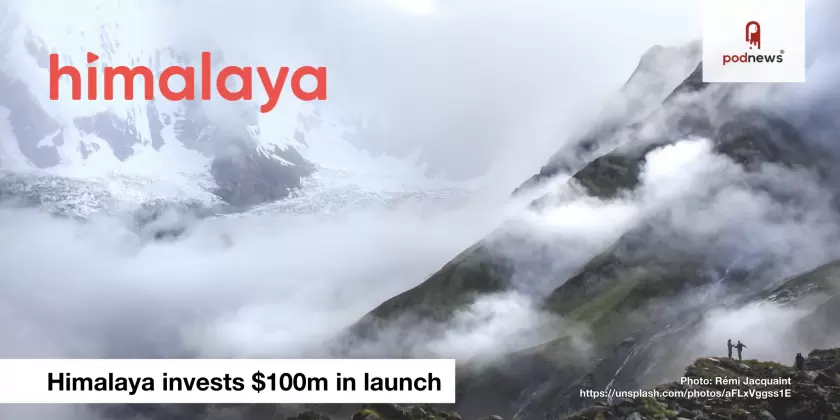
New podcast platform launches with $100m investment
This article is at least a year old
(There’s lots about yesterday’s Spotify+Gimlet+Anchor news below. But first…)
-
Himalaya have invested $100m in a launch of a “creator-focused, innovative podcast platform, network and community”. The platform includes monetisation for podcasters, including tipping and follower bonuses; the company has signed a bunch of new shows, and partnered with Acast and Megaphone. It has expertise from the wildly successful Ximalaya FM platform in Asia.
- You can claim your podcast on the Himalaya platform today.
-
Podcharts is out of beta. They’ve mailed users of the service with details of how to subscribe.
-
Just reached beta: Podcast·co, “a no-fuss way to publish and organise your podcasts”. There’s an online product tour.
-
WNYC has named Andrew Golis (Vox, The Atlantic, PBS) as their new Chief Content Officer. He will work across WNYC News, WNYC Radio, and WNYC Studios.
-
Should you use 44.1kHz or 48kHz sample rate for your podcast? Allan Tépper has launched the 48kHz Alliance, giving reasons why he feels 48kHz is preferable, and taking Libsyn’s Rob Walch to task for a statement he made in The Feed. (Our podcast technical analytics measure the samplerate of recent podcasts).
-
The case against Adnan Syed has a trailer up - it’s a TV show on HBO, premiering on March 10th, focusing on the original Serial case.
-
Gwyneth Paltrow’s Goop will now be heard on Delta planes in the US.
-
Our podcast pages now link directly to Podchaser. (Here’s The Economist’s The Intelligence).
Spotify+Gimlet+Anchor
Yesterday, Spotify bought Gimlet (a top-end podcast producer) and Anchor (a set of tools for making and hosting podcasts). Terms were not disclosed: pricing from those familiar with the sale appear to be about US$230m for Gimlet, and around US$50m US$25m for Anchor. Spotify’s founder, Daniel Ek, blogged about the strategy, notably: “With the addition of Gimlet and Anchor, Spotify will now become the leading global podcast publisher with more shows than any other company.” He also spoke on CNBC: “Our users who are listening to podcasts are listening to the platform almost twice as much.” He is also quite bullish about the future, saying “I don’t think it is unlikely that it is a Netflix type of story … of us doubling that investment year over year to get more and more content.”
- Relax, Reply All listeners. Here’s a full transcript of the investor’s call - including Daniel Ek saying: “Just to be very clear, the goal is not with Gimlet nor with Anchor to make any of their existing content exclusive, but to focus on the content that we’re developing at Spotify and make more exclusive deals going forward.”
- Anchor have also blogged to their users. “The way you create, distribute, and monetize on Anchor does not change.”
- Tom Webster points out Edison Research numbers showing that 25% of audio listened-to is speech programming (aka “podcasts”), which explains why Spotify want to invest in podcasting if they want to be the #1 audio platform in the world. He also suggests that this paves the way for commercial music in podcasts (since Spotify holds the licences) - and perhaps means a reinvention of music radio, too.
- TechCrunch appears to have an interview with Spotify’s Chief R&D Officer Gustav Söderström (though it’s unclear when the interview was conducted). “We think this is the right time to invest. We could have continued on our own, but we think this is a great acceleration of the strategy we already had.” The article also says that Anchor’s branding and products will remain (though “it wouldn’t offer the same promise for Gimlet’s brand”).
- Former Gimlet staffer Nathan Baschez posts ten predictions based on the news. He predicts Anchor’s technology will be used by local advertisers within Spotify’s wider product.
- Bello Collective’s Amanda McLoughlin posts advice for podcasters following the buyout - particularly, that platforms are tools and not friends.
- Dallas Taylor (Twenty Thousand Hertz) is good enough to post an honest thought: “All of my thoughts about the Gimlet/Spotify deal are clouded by my raging jealousy.”
- Helen Zaltzman (The Allusionist) points out that “the podcast gold rush times of the past few years have not really spread money around to lots more podcasters.”
- Zack Kahn (Vox Media) compares podcasting to radio - even with this big purchase of perhaps $260m, radio is still worth US$19bn. “We’ve got a ways to go”, he adds.
- James Cridland (Editor, Podnews) added: “The US podcast market is $314m. The Chinese podcast market is over $7bn. The Chinese use subscription as their primary model. If only Apple had every single iPhone user’s credit card details, and some kind of in-app payment system.” He’s being a little sarcastic.
- Mark Mulligan, a music industry technologist, isn’t convinced, citing a number of different reasons why “the future of podcasts may lie elsewhere”.
- Hot Pod’s Nick Quah is on holiday in Malaysia, but still appears to have been interviewed by TechMeme’s Ride Home podcast, and has written for NiemenLab. Get some rest, Nick.
Podcast
- In a special edition of Start Here, Brad Mielke goes inside the chamber to hear the State of the Union speech for himself. From reporters, to analysts, to a surprise visit from Alexandria Ocasio-Cortez, this edition breaks down the biggest moments.
































































































